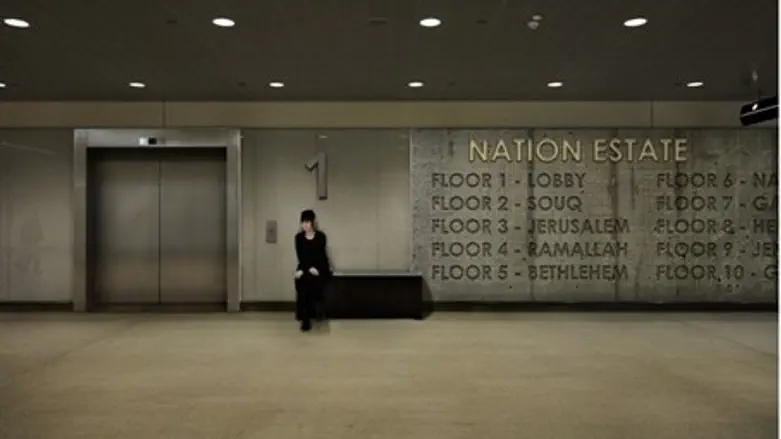
A Palestinian Authority artist has managed to destroy corporate support for a major international art competition and exhibition.
The prestigious Lacoste Elysee Prize, awarded by the Musee de l'Elysee in Lausanne, Switzerland with sponsorship from French clothing brand Lacoste (with the little crocodile), has been withdrawn due to a brouhaha created by "Bethlehem artist" Larissa Sansour, who actually lives in London.
According to a news release she published through the PA news agency WAFA, the artist, who was born in Jerusalem, was short-listed for the 2011 prize. The winning artist was to be awarded the prize for a work that best symbolized the theme "joie de vivre," happiness or literally "joy of life."
As a nominee, Sansour was granted a bursary of 4,000 euros (approx $5,200) with which to carry out the task, and given carte blanche to produce a portfolio of images for the final judging. In November, three photos of her Nation Estate project were submitted to the judges.
And that's where the trouble began. Rather than depicting joy, Sansour's work symbolized politics.
Conceived in the wake of the PA's bid for United Nations membership, Nation Estate "depicts a science fiction-style Palestinian state in the form of a single skyscraper housing the entire Palestinian population. Inside this new Nation Estate, the residents have recreated their lost cities on separate floors: Jerusalem on 3, Ramallah on 4, Sansour's own hometown of Bethlehem on 5, etc.," the artist described.
But because the work did not meet the criteria she was given, Sansour -- whose work really is excellent -- was asked to withdraw her entry, and her name was removed from the list of nominees. As an alternative, the artist was offered the option of exhibiting her work separately in a solo exhibition at the museum -- an honor for which most artists would happily donate their eyeteeth.
Outraged, Sansour declined and released a statement claiming the move to be "censorship."
"As a politically involved artist I am no stranger to opposition but never before have I been censored by the very same people who nominated me in the first place," she wrote. "Lacoste’s prejudice and censorship puts a major dent in the idea of corporate involvement in the arts. It is deeply worrying.”
Both Lacoste and the museum responded immediately with a joint statement to the British Journal of Photography, bluntly noting that Sansour's work was removed from the competition "because it didn't fit within the them of this year's edition of the Lacoste Elysee Prize... We regret the political interpretation that has arisen from our decision."
Meanwhile, the museum suspended the competition, worth 25,000 euros, altogether due to the controversy, and because administrators were angry over the "private partner's decision" to remove Sansour's work from the nominations. "We reaffirm our support to Larissa Sansour for the artistic quality of her work and her dedication," the museum said in a separate statement on its website, which also carried a pitch for the "Electronic Intifada."
An online exhibition of the work by other nominees will be available on the websites of Lacoste, the Musee de l'Elysee and ArtReview magazine -- but thanks to disgruntled Larissa Sansour, the Lacoste prize has been cancelled, with all the other artists thus deprived of their opportunity to compete and museum-goers deprived of their opportunity to enjoy a chance to view the winner's talent.